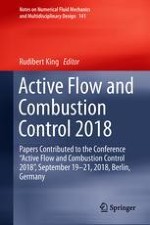2019 | OriginalPaper | Buchkapitel
Influence of Operating Conditions and Residual Burned Gas Properties on Cyclic Operation of Constant-Volume Combustion
verfasst von : Quentin Michalski, Bastien Boust, Marc Bellenoue
Erschienen in: Active Flow and Combustion Control 2018
Aktivieren Sie unsere intelligente Suche, um passende Fachinhalte oder Patente zu finden.
Wählen Sie Textabschnitte aus um mit Künstlicher Intelligenz passenden Patente zu finden. powered by
Markieren Sie Textabschnitte, um KI-gestützt weitere passende Inhalte zu finden. powered by
